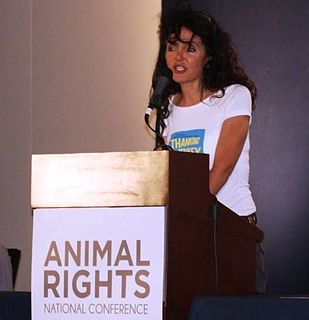A Quote by Julie Klausner
There are good intentions behind many people's conversion to veganism, including an admirable devotion to the well-being of animals and a justified skepticism about the crap the USDA allows manufacturers to put in our food. But it's hard to ignore the often sanctimonious nature of what some nutritionists view as an 'extremist' way of eating.
Related Quotes
There are good intentions behind many peoples conversion to veganism, including an admirable devotion to the well-being of animals and a justified skepticism about the crap the USDA allows manufacturers to put in our food. But its hard to ignore the often sanctimonious nature of what some nutritionists view as an extremist way of eating.
Our ingenuity in feeding ourselves is prodigious, but at various points our technologies come into conflict with nature's ways of doing things, as when we seek to maximize efficiency by planting crops or raising animals in vast mono-cultures. This is something nature never does, always and for good reasons practicing diversity instead. A great many of the health and environmental problems created by our food system owe to our attempts to oversimplify nature's complexities, at both the growing and the eating ends of our food chain.
I find it very annoying that so many animal advocates talk about the difficulty of being vegan. Many animal advocates are inclined to make the issue their suffering and not the animals' suffering, and I suppose that accounts for part of the reason that veganism is portrayed as such a "sacrifice." And many animal advocates are not vegans, or are "flexible vegans," which means that they do not observe veganism at all or not consistently, and emphasizing the supposed difficulty of veganism is part of justifying their own behavior.
99% of our uses of animals, including our numerically most significant use of them for food, do not involve any sort of necessity or any real conflict between human and nonhuman interests. If animals matter morally at all, then, even without accepting a theory of animal rights, those uses of animals cannot be morally justified.
Food safety oversight is largely, but not exclusively, divided between two agencies, the FDA and the USDA. The USDA mostly oversees meat and poultry; the FDA mostly handles everything else, including pet food and animal feed. Although this division of responsibility means that the FDA is responsible for 80% of the food supply, it only gets 20% of the federal budget for this purpose. In contrast, the USDA gets 80% of the budget for 20% of the foods. This uneven distribution is the result of a little history and a lot of politics.
What is it to keep kosher? Is it eating kosher potato chips? Kosher is a bigger idea. I think it's about being healthy. But according to some people, it's about not eating this food because it's forbidden by the Jewish law. My view of the halachah changed a little bit. The laws are there hopefully to be a tool.
Some people feel that humans have a right to eat other animals but not to trash the earth. They may choose veganism because a vegan's ecological footprint is light, but once they are not invested in eating animals, they are more likely to be willing to learn the details of what happens to them. That learning will encourage compassionate people to stick with a plant-based diet.
Devotion {to the spiritual master} becomes the purest, quickest, and simplest way to realize the nature of our mind and all things. As we progress in it, the process reveals itself as wonderfully interdependent: We, from our side, try continually to generate devotion; the devotion we arouse itself generates glimpses of the nature of mind, and these glimpses only enhance and deepen our devotion to the master who is inspiring us. So in the end devotion springs out of wisdom: devotion and the living experience of the nature of mind becomes inseparable, and inspire one another.
The way we eat has changed more in the last 50 years than in the previous 10,000…. Now our food is coming from enormous assembly lines where the animals and the workers are being abused, and the food has become much more dangerous in ways that are deliberately hidden from us. This isn’t just about what we’re eating. It’s about what we’re allowed to say. What we’re allowed to know.
That eating should be foremost about bodily health is a relatively new and, I think, destructive idea-destructive not just the pleasure of eating, which would be bad enough, but paradoxically of our health as well. Indeed, no people on earth worry more about the health consequences of their food choices than we Americans-and no people suffer from as many diet-related problems. We are becoming a nation of orthorexics: people with an unhealthy obsession with healthy eating.































